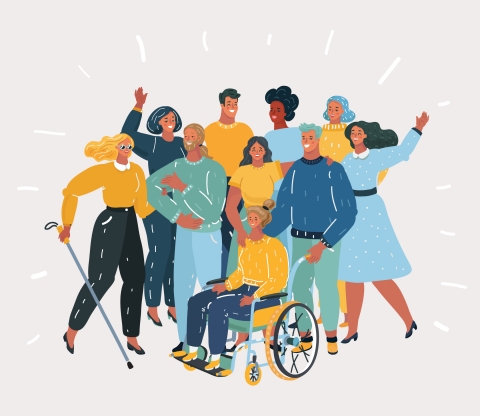The (Not So) Subtle Art Of Not Being A Jerk
 |
| Who are we to decide what other people's lives are like? (Image: shutterstock) |
“Don’t stare.”
That’s the only instruction I remember receiving from my mom as a child, whenever we ran into someone with a visible disability. I think she was just so terrified that I would say something inappropriate or ask difficult questions that she preferred to avoid the subject altogether.
It took me years to realize that maybe that child with a physical or developmental disability at the mall was just having a great day with their parents, wearing their best outfit and feeling super cute. Maybe, it was their birthday, or they had just watched a great movie. Why were the only two options pitying them or pretending they were not there?
I was not properly educated to deal with disability. Like many other people, I often didn’t know what to say or how to act, even though I wanted to do the right thing. I’m definitely less clueless now than I was in the past, but I still have so much to learn. I’m thankful there are so many valuable resources on the internet, like the channel Special Books by Special Kids on YouTube, where the host interviews hundreds of people with disabilities. Another interesting discovery I've made recently was Sarah Talbi's channel. There, she shares a bit of her routine: how she cooks, eats with a fork, washes her hair and takes care of her small child - even though she has no arms.
I’ve realized that people with physical limitations are often able to do way more than we think. Many of them are probably tired of being asked if they need help all the time. I do worry sometimes, what if somebody does need help with something and they are tired of having to ask? What if they are there thinking “Can’t you see I need a straw to drink this?” or “Isn’t it obvious I’d appreciate it you pushed my wheelchair up this ramp?” While I still get confused at times about what to do, it is my understanding at this point that I should ask if the person needs help and wait for a reply before jumping in. If they say they are okay... well, then they are okay.
Interacting with someone who is neurodivergent can also be a bit confronting if you have never been in that situation. What I have learned is that active listening and attention are key. Many neurotypical people worry so much about being nice and empathetic that they don’t realize they are being condescending.
When we are writing a story, it takes a good deal of sensibility and awareness to properly mention or describe people with disabilities. The language we choose to use can communicate bias and prejudice that we didn’t even realize we had.
According to the material I have had access to in my PCJ (Professional Communication and Journalism) course, someone’s disability shouldn’t even be mentioned if it’s not relevant to the story. If a person is interviewed during a protest for better salaries, why does it matter if they have Down syndrome?
When the disability is relevant to the narrative, there are proper ways to include that information. It comes without saying that slurs are out of the table, but there are more subtle expressions, such as “suffers a hearing loss”, that do not, if you really think about it, sound right. People often use words with a negative connotation when referring to someone with a disability, such as “suffers”, “struggles”, “confined to a wheelchair.” How can we assume that someone’s life is miserable, and why would we do that? A disability is only one aspect of a person's being. In the example above, it would be much better to say “person who is hard of hearing” instead.
I believe anybody can make a mistake or say the wrong thing, but we can't become defensive if somebody points it out. We should never stop learning. It is common to have misconceptions about groups that go through situations that we have never experienced. Two men have recently invented pink gloves that women could use to dispose of their tampons (I’m not even kidding). They thought it was a genius idea. Why not ask women what they want to see in the market? We don’t need to theorize what things are like for people whose lives are different from ours. We just need to listen to what they have to say.


Comments
Post a Comment